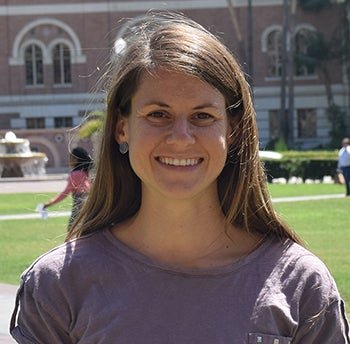Center for Advanced Genocide Research Awards USC Graduate Student Research Fellowship to Lacey Schauwecker
Three years ago, Lacey Schauwecker became interested in the Guatemalan Genocide through work she was doing with USC Shoah Foundation. Now, Schauwecker is back for four weeks as a 2016 Summer Graduate Research Fellow at the Center for Advanced Genocide Research utilizing the Institute’s Guatemalan testimonies.
Schauwecker is working on her dissertation for her Ph.D. in Comparative Literature, in which she critiques existing human rights paradigms by exploring screaming in art and testimony in Central America. The first chapter focuses specifically on testimonies from the Guatemalan Genocide. Schauwecker has watched about a dozen testimonies from the Institute’s new Guatemalan Genocide collection during her time at the Institute and noted mentions of screaming and other moments of non-narrative interruption.
“I focus on screaming because it is a recurrent trope in a lot of books and photography and performance art about ongoing violence in Central America, including Guatemala,” she said.
One instance of screaming in the testimonies that Schauwecker made note of is a woman recounting a man screaming as he was mutilated — something that the woman said haunts her to this day.
“She says that the memory of that scream woke her up for years,” Schauwecker said. “Lots of memories stuck with her, but that was the most potent memory and it continually disturbed her for decades after.”
Schauwecker is comparing the testimonies she watches during her time at the Center with that of Rigoberta Menchú, a well-known Guatemalan human rights activist who gave her own testimony for the first time about 30 years ago.
“Rigoberta Menchú is a big human rights activist,” she said. “A lot of the witnesses in this archive are involved in human rights work, but my argument so far is that they seem to exercise more expressive freedom than Rigoberta Menchú does.”
In addition to screams of terror during violence, Schauwecker pointed out that another time screaming happens is as a form of political resistance.
“One woman [in her testimony] says, ‘The more they terrorize us, the more we scream back,” she said. “Screaming is like a raised fist in some ways.”
Part of the protest Schauwecker sees Guatemalans currently raising is resistance to traditional definitions of justice and truth.
“Rather than people being timid and giving all the authority over to legal institutions, they’re saying, ‘This is what the truth is, and this is our reality,’” she said. “I’m thinking about how screaming relates to this idea of people asserting their own reality and their own truth and their own modes of justice.”
Part of the issue with existing human rights and justice institutions in Guatemala, is many people who were involved in the war in the 1980s are still in power in the government. This makes it hard to pursue legal justice for some of the perpetrators of the genocide. But, it also forces people to think of justice in different ways, something Schauwecker believes to be a positive change.
“[One witness] says, ‘You can’t take down the master’s house with the same tools the master gave you,’” Schauwecker said. “She points out the limits of the legal system and also points out that people need to be involved in telling their own stories of violence.”
In addition to Guatemala, Schauwecker’s dissertation also focuses on Central Americans migrating through Mexico and the region’s diaspora populations in the United States.
